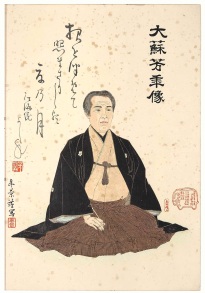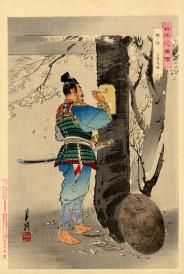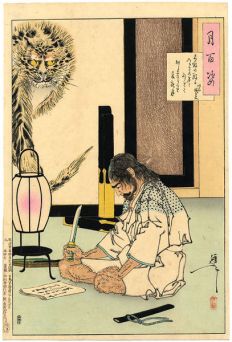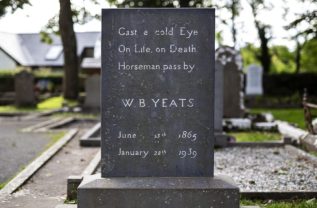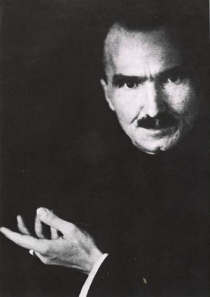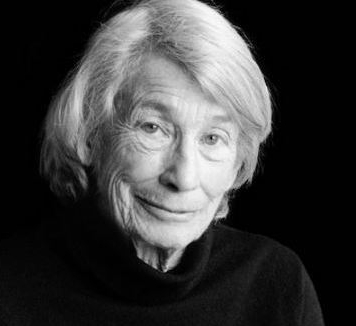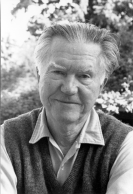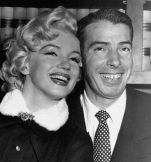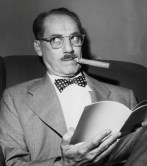Part One
O death, where is thy sting? O grave, where is thy victory? – 1 Corinthians
Part One: The Far East
How do we want to be remembered? Death poems (jisei) developed in the literary traditions of Japan as early as the seventh century. Later, taking much energy from Zen Buddhism’s emphasis on the transiency and impermanence of the material world, the genre spread to China and Korea. Brief as they usually are, these poems consider the big questions, both in general and in terms of the author’s own life and imminent death.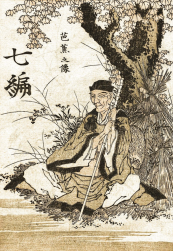
They were traditionally composed by samurai warriors, nobleman and monks, often as final parting gifts to their disciples. The essential idea of the jisei was that in one’s final moments his reflection on death could be especially lucid and therefore an important observation about life.
Some are written as haiku, although most appear in the 31 syllable (5-7-5-7-7) tanka format. Both forms seek to transcend rational thought and evoke a realization that counters our dualistic divisions between beauty and ugliness, life and death, future and present. Some jisei are dark while others are hopeful. They each reflect what is on the mind during the last days or moments of the writer. Acceptance – including the inevitability of death – is one of the key elements:
Breathing in, breathing out,
Moving forward, moving back,
Living, dying, coming, going —
Like two arrows meeting in flight,
In the midst of nothingness
Is the road that goes directly
to my true home. – Gesshu SokoLike dew drops
on a lotus leaf
I vanish. – ShinsuiSince time began
the dead alone know peace.
Life is but melting snow. – NandaiI pondered Buddha’s teaching a full four and eighty years.
The gates are all now locked about me. No one was ever here –
Who then is he about to die, and why lament for nothing? Farewell! The night is clear, the moon shines calmly,
the wind in the pines is like a lyre’s song.
With no ‘I’ and no other who hears the sound? – Zoso RoyoWhat shall I become when this body is dead and gone?
A tall, thick pine tree on the highest peak of Bongraesan,
Evergreen alone when white snow covers the whole world. – Seong Sam-munAs the sound of the drum calls for my life,
I turn my head where the sun is about to set.
There is no inn on the way to the underworld.
At whose house shall I sleep tonight? – Jo Gwang-joEmpty handed I entered the world.
Barefoot I leave it.
My coming, my going-
Two simple happenings that got entangled. – KozanOh young folk —
if you fear death, die now!
Having died once
you won’t die again. – Hakuin EkakuRiding this wooden upside-down horse, I’m about to gallop through the void. Would you seek to trace me? Ha! Try catching the tempest in a net. – Kukoku
Inhale, exhale,
Forward, back, Living, dying:
Arrows, let flown each to each
Meet midway and slice the void in aimless flight. Thus I return to the source. -Gesshu SokoFrost on a summer day:
all I leave behind is water
that has washed my brush. – ShuteiHolding back the night
with its increasing brilliance
the summer moon. – YoshitoshiNot even for a moment do things stand still. Witness color in the trees. – Seiju
From ancient times the saying comes: “There is no death, there is no life.” Indeed, the skies are cloudless and the river waters clear. – Toshimoto
Before long I shall be a ghost. But just now how they bite my flesh! The winds of autumn. – Fuse Yajiro
My whole life long I’ve sharpened my sword
And now, face to face with death
I unsheathe it, and lo –
The blade is broken – Alas! – Dairin SotoLife is an ever-rolling wheel. And every day is the right one. He who recites poems at his death adds frost to snow. – Mumon Gensen
Death poems
are mere delusion —
death is death. – TokoI raise the mirror of my life up to my face: sixty years. With a swing I smash the reflection. The world as usual all in its place. – Taigen Sofu
The fourth day of the new year; What better day to leave this world! – Aki No-Bo
Although the autumn moon has set, its light lingers on my chest. – Kanshu
My old body: a drop of dew grown heavy at the leaf tip. – Kiba
I cast the brush aside – From here on I’ll speak to the moon face to face. – Koha
I cleansed the mirror of my heart – now it reflects the moon. – Renseki
Time to go. They say the journey is a long one: Change of robes. – Roshu
Boarding the boat, I slip off my shoes: Moon in the water. – Seira
Autumn winds: Having sworn to save all souls, I am at peace. – So’Oku
The moon leaks out from sleeves of cloud and scatters shadows. – Tanko
In the twentieth century, death poems commented on the “real” world of politics. When Yukio Mishima’s military coup failed, he left a final poem before committing ritual suicide:
A small night storm blows
Saying ‘falling is the essence of a flower’
Preceding those who hesitate
Composing a death poem was a task that demanded time and consideration, even input and criticism from others. But they were not necessarily without humor:
Bury me when I die
beneath a wine barrel in a tavern.
With luck the cask will leak. – Moriya Sen’anPeople, when you see the smoke, do not think it’s fields they’re burning. – Baika
Many things befell me as I followed Buddha three and seventy years. What is death Freely, from my own true self: Ho, Ho! – Ensetsu
Moon in a barrel: You never know just when the bottom will fall out. – Mabutsu
Life is like a cloud of mist emerging from a mountain cave. And death a floating moon in its celestial course. If you think too much about the meaning they may have, you’ll be bound forever like an ass to a snake. – Mumon Gensen
Dimly for thirty years, faintly for thirty years – dimly and faintly for sixty years: at my death I pass my feces and offer them to Brahma. – Ikkyu
Had I not known that I was dead already, I would have mourned my loss of life. – Ota Dokan
My life was lunacy until this moonlit night. – Tokugen
The owner of the cherry blossoms turns to compost for the trees. – Utsu
Till now I thought that death befell the untalented alone. If those with talent, too, must die, surely they make a better manure! – Kyoriku
Ninth-month moon: Of late, when I have said my prayer, I’ve meant it. – Kisei
Narushima Chuhachiro started drafting death poems at the age of fifty lest he die unprepared. He sent one of his last poems to his teacher:
For eighty years and more, by the grace of my sovereign and my parents, I have lived with a tranquil heart between the flowers and the moon.
The teacher’s response: “When you reach age ninety, correct the first line.”
Even satire could find its way into a death poem. Bashō’s jisei is well-known:
Falling ill on a journey
my dreams go wandering
over withered fields.
Another, unknown poet clearly familiar with Bashō wrote:
Locked in my room, my dream goes wandering over brothels.
Part Two: The West
Yoel Hoffman, editor of Japanese Death Poems, observes that jisei poetry arose out of a culture of extreme conformism:
Death poems reveal that before death, the Japanese tend rather to break the restraints of politeness that hold them back during their lifetime. After a lifetime of fitting in, there’s an opportunity to go against the grain in one’s last moments, after which one can hardly be punished for unorthodoxy.
Angela Chen compares jisei and Western death poems. These differing traditions offer a glimpse into the clash of individualism versus collectivism and spontaneity versus control:
When the group takes precedence, as is the case in many East Asian cultures, its members spend much of their lives bending to the collective will and holding back their individual quirks and needs. Against this backdrop, death poems provide a break from conformity, a cherished opportunity to say what one really thinks.
Modern Western poets, on the other hand, favor
…spontaneous last words that serve as a final confirmation of your personal brand…In the West, the pull away from religion, coupled with the emphasis placed on individualism, provided both the freedom to perform our “authentic” selves and the responsibility to make sure those authentic selves were…never phony. Last words are a final chance to reinforce the unique personality the speaker has worked so hard to cultivate throughout his life.
And yet I think I see more similarities than differences. Here are some last words, epitaphs and final poems and comments on death by Western writers:
Shakespeare:
Good friend, for Jesus’ sake forbeare, To dig the dust enclosed heare. Bleste be the man that spares these stones And curst be he that moves my bones. (Epitaph)
Antonio Machado:
And on that last day when finally I embark
on that ship that will never turn back,
you’ll find me shirtless, traveling light
almost naked like the children of the sea. – from Self Portrait
Seamus Heaney:
Walk on air against your better judgment. (Epitaph)
Noli timere (“Don’t be afraid” – texted to his wife shortly before his death)
No longer in Lethean foliage caught
begin the preparation for your death
And from the fortieth winter by that thought
Test every work of intellect or faith,
And everything that your own hands have wrought
And call those works extravagance of breath
That are not suited for such men as come
proud, open-eyed and laughing to the tomb.
– From Vacillation
How can I, that girl standing there, my attention fix
On Roman or on Russian or on Spanish politics,
Yet here’s a travelled man that knows what he talks about,
And there’s a politician that has both read and thought,
And maybe what they say is true of war and war’s alarms,
But o that I were young again and held her in my arms.
– from his final poem, Politics
And his epitaph, from Under Ben Bulben:
Cast a cold eye
On life, on death.
Horseman, pass by!
I hope for nothing.
I fear nothing.
I am free. (Epitaph)
Pablo Neruda:
And now I’m going behind
This page, but not disappearing.
I’ll dive into clear air
Like a swimmer in the sky,
And then get back to growing
Till one day I’m so small
That the wind will take me away
And I won’t know my own name
And I won’t be there when I wake.
Then I will sing in the silence.
A train waits for me, a ship
loaded with apples,
an airplane, a plough,
some thorns.
Goodbye, harvested
fruits of the water, farewell,
imperially dressed shrimps,
I will return, we will return
to the unity now interrupted.
I belong to the sand:
I will return to the round sea
and to its flora
and to its fury:
but for now – I’ll wander whistling
through the streets.– from Farewell to the Offerings of the Sea
Ranier Maria Rilke:
No yearning for an afterlife, no looking beyond,
no belittling of death,
but only longing for what belongs to us
and serving earth, lest we remain unused.
When it’s over, I don’t want to wonder
if I have made of my life something particular, and real.
I don’t want to find myself sighing and frightened, or full of argument.
I don’t want to end up simply having visited this world.
– from When Death Comes
Czeslaw Milosz:
In advanced age, my health worsening,
I woke up in the middle of the night,
and experienced a feeling of happiness
so intense and perfect that in all my life
I had only felt its premonition.
And there was no reason for it.
It didn’t obliterate consciousness;
the past which I carried was there,
together with my grief.
And it was suddenly included,
was a necessary part of the whole.
As if a voice were repeating:
“You can stop worrying now;
everything happened just as it had to.
You did what was assigned to you,
and you are not required anymore
to think of what happened long ago.”
The peace I felt was a dosing of accounts
and was connected with the thought of death.
The happiness on this side was
like an announcement of the other side.
I realized that this was an undeserved gift
and I could not grasp by what grace
it was bestowed on me.
– Awakened
William Stafford:
If the sky lets go some day and I’m
requested for such volunteering
toward so clean a message, I’ll come.
The world goes on and while friends touch down
beside me, I too will come.– from November
Now—these few more words, and then I’m gone:
Tell everyone just to remember their names,
and remind others, later, when we find each other.
Tell the little ones to cry and then go to sleep, curled up
where they can. And if any of us get lost,
if any of us cannot come all the way—
remember: there will come a time when
all we have said and all we have hoped will be all right.
– from A Message From the Wanderer
Raymond Carver:
And did you get what
you wanted from this life, even so? I did.And what did you want?
To call myself beloved, to feel myself
beloved on the earth.– from Late Fragment
Thomas McGrath:
Down the small and crooked road
I walk straight toward my death.
How marvelous the moon sits on my shoulder!
The wind is laughing as I laugh.
It has been a long journey. And now, at the end of it,
Like a boat that broke free and drifted far down the river,
I come to rest on an unknown shore:
Half in, half out of the water.
Stephen Dobyns:
Somewhere that shovel stands propped against a wall,
the patch of grass is freshly cut where that final hole will be dug.
Let’s march toward our grave scratching and farting,
our own raucous music of shouted good-byes.
Let’s make sure they bury us standing up.
– from Uprising
Abe Osheroff (lifelong political activist):
My ship is slowly sinking, but my cannons keep firing.
Or, here’s another way to say it:
I have one foot in the grave
and the other keeps dancing.
Anonymous, from the Kuba People of Zaire:
When I die, don’t bury me under forest trees; I fear their thorns.
When I die, don’t bury me under forest trees; I fear their dripping water.
Bury me under the great shade trees of the market.
I want to hear the drums beating. I want to feel the dancers’ feet.
Woodie Guthrie:
My sweat can grease the engines
That makes the whole thing run
And the ruling class can kiss my ass
‘Cause I had a heap of fun
Jackie Gleason (epitaph):
And Away We Go!
(Reputed) Last Words:
Johann Sebastian Bach:
Don’t cry for me, for I go where music is born.
Frederic Chopin:
Play Mozart in memory of me, and I will hear you.
Gustav Mahler:
Mozart! Mozart!
I’ll finally get to see Marilyn.
Roger Ebert:
I’ll see you at the movies.
Salvador Allende:
Long live Chile! Long live the people! Long live the workers! These are my last words, and I am certain that my sacrifice will not be in vain, I am certain that, at the very least, it will be a moral lesson that will punish felony, cowardice, and treason.
Rilke:
I don’t want the doctor’s death. I want to have my own freedom.
Henry David Thoreau:
I did not know that we had ever quarreled. (Upon being urged to make his peace with God)
Gertrude Stein:
What is the answer?…In that case, what is the question?
Leonardo Da Vinci:
I have offended God and mankind because my work did not reach the quality it should have.
Die, my dear? Why, that’s the last thing I’ll do!
Steve Jobs:
Oh wow. Oh wow. Oh wow.
Carl Jung:
Let’s have a really good red wine tonight.
And finally, my obituary for Greg Kimura:
Greg called me “brother” – not because we socialized together, but because the time we spent together was in ritual space. There, everyone who could stand the heat, stay in the room and laugh or weep together was either a brother or a sister. We shared these spaces for five years in our weekly men’s group, ten years at men’s retreats in Mendocino, poetry salons and grief rituals.
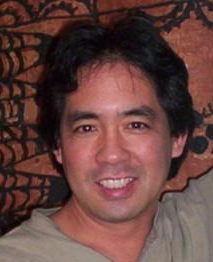 Greg was “a man of sorrows, acquainted with grief.” And for that reason, he was full of joy. Does that sound strange? I’m reminded of a friend who visited a West African village and asked a particular woman why, despite her poverty, she seemed so happy. She responded, “Because I cry a lot.”
Greg was “a man of sorrows, acquainted with grief.” And for that reason, he was full of joy. Does that sound strange? I’m reminded of a friend who visited a West African village and asked a particular woman why, despite her poverty, she seemed so happy. She responded, “Because I cry a lot.”
Greg was rock solid. At these rituals he could always be counted on to be one of the drummers. And that’s no simple or easy thing. It means to maintain the beat for up to two hours, to hold the container while others release their pent-up feelings in the sacred work of grief. It’s one of the countless ways in which Greg served the beauty and the terror of this world.
Because of this, Greg’s humor was inseparable from both his pain and his compassion. His Caring Bridge website said, “Hi. I’m Greg and I’m dying. And so are you!” And his poetry. I’d like to think that this crazy insight came from his knowledge of Rumi, who wrote:
Listen, I would make this very plain
If someone were ready to hear what I have to tell:
Everybody in this world is dying.
Everybody is already in their death agony.
So listen to what anyone says as though it were
The last words of a dying father to his son.
Listen with that much compassion, and you’ll
Never feel jealousy or simple anger again.
People say everything that’s coming will come.
Understand this: It’s all here right now.
And me? I’ve been so woven into the mesh of my trivial errands
That only now do I begin to hear the mystery of dying everywhere.
Greg had done much difficult interior work, and so (depending on your point of view) he was a real Christian, a real Buddhist and/or a real Pagan. Perhaps I’m idealizing here – the family knows far better than I – but it seemed that he achieved a profound sense of peace with his own death, an ability to be in the moment. True to his Japanese heritage, he wrote what I think is his own jisei:
Resist the World’s Numbness
And your passion revive,
so when death comes to find you,
Iet him find you alive.
He was lucky in those last nine months to be surrounded by so much love, appreciation and music. When we visited for the last time and I asked him “How are you doing?” he responded, without a trace of irony, Couldn’t be better!”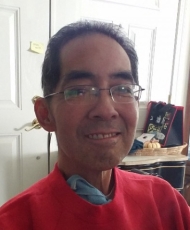
So finally he was a teacher, who left me with a spontaneous Zen koan that I’ll be working with for a long time. We recited some favorite poems together, including this one of his:
Sacred Wine
Sit with the pain in your heart, he said.
Hold it like a sacred wine in a golden cup.
The wine may break you and if it does, let it.
To be human is to be broken,
and only from brokenness can one be healed.
The ancestors say: the world is full of pain,
and each is allotted a portion.
If you do not carry your share, then others are forced to carry it for you,
And the suffering you bring to the world is your sin,
But the suffering you bring to yourself will be your hell.
Sit with the pain in your heart, he said.
Hold it there like a sacred wine in a golden cup.
When we got to the third from the last line, he interrupted me:
…the suffering you bring to yourself will be your salvation.
